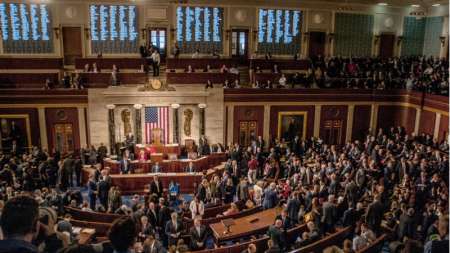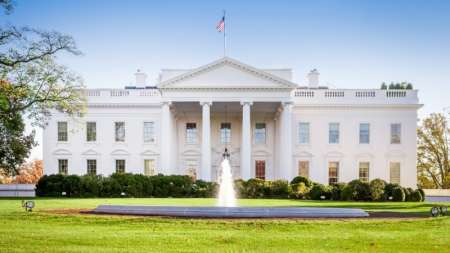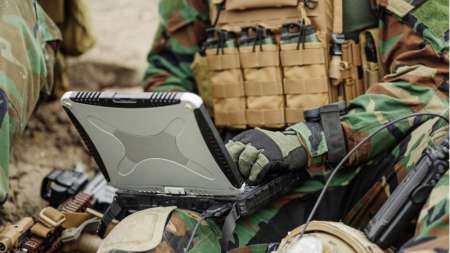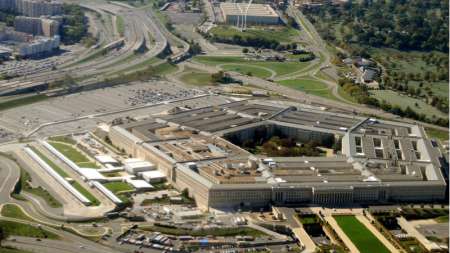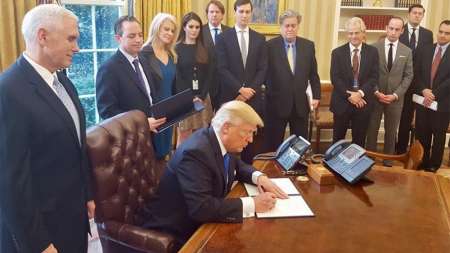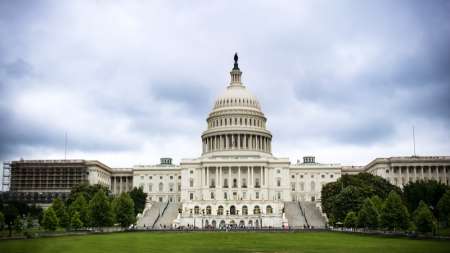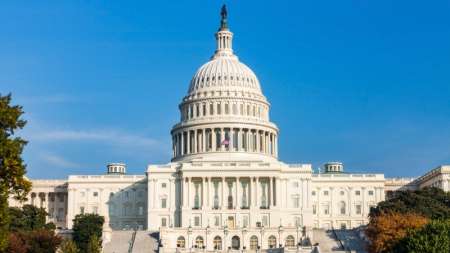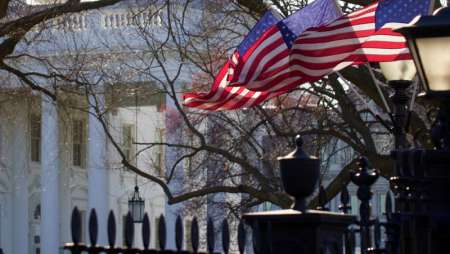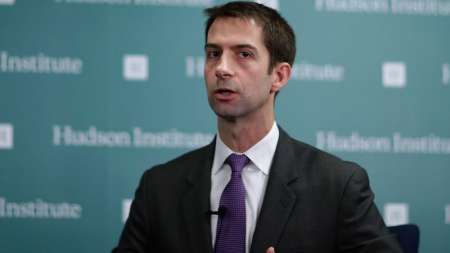The House on July 11 approved an amendment to its version of the FY2020 National Defense Authorization Act (H.R. 2500) that would block the Trump administration’s plan to merge the Office of Personnel Management (OPM) and the General Services Administration. […]
A bipartisan proposed amendment to the House version of the National Defense Authorization Act (NDAA) for fiscal year 2020 would prevent the Department of Homeland Security (DHS) and the Department of Justice (DoJ) from spending funds on any expansion of facial recognition technologies. […]
The White House on July 9 released a lengthy list of concerns it has with the FY 2020 National Defense Authorization Act (H.R. 2500) set for debate in the House, and said the current bill would likely earn a veto recommendation from President Trump’s advisors. The list of issues that concern the White House runs to several dozen items, and in all likelihood does more to stake out negotiating positions rather than present a list of eventual deal killers. […]
The Department of Defense (DoD) netted its highest grade on the FITARA (Federal IT Acquisition Reform Act) Scorecard yet, earning a C+ on the eighth version of the biannual scorecard released today by the House Oversight and Reform Committee. […]
The House Armed Services Committee draft version of the fiscal year 2020 National Defense Authorization Act (NDAA), released June 3, includes multiple provisions that would increase congressional oversight over multiple Defense Department (DoD) technology initiatives. […]
China-based network equipment maker Huawei filed a motion for summary judgement in ongoing litigation with the U.S. government in the U.S. District Court for the Eastern District of Texas challenging the constitutionality of Section 889 of the 2019 National Defense Authorization Act (NDAA) under which the Federal government is barred from buying Huawei equipment and services. […]
The Defense Innovation Board (DIB) released a study and draft implementation plan today to help the Department of Defense (DoD) overhaul its software acquisition processes, with DoD looking to pilot some of the recommendations in fiscal year 2020 and implement on a department-wide basis in the FY2021 National Defense Authorization Act (NDAA). […]
As the first chief data officer of the Department of Defense (DoD), Michael Conlin described the challenges of approaching a vast mountain of data from numerous systems at the Pentagon, and making it actionable information for the department. […]
The Department of Defense (DoD) published a new proposed rule in the Federal Register on Tuesday that follows through on legislation to remove the lowest price technically acceptable (LPTA) acquisition methodology from IT and cybersecurity acquisitions, in favor of the tradeoff source selection process. […]
Mike Madsen, partner at the Defense Innovation Unit, said today that DIU is preparing to wrap up its search for a new managing director who will help guide activities at DIU, the newly-elevated commercial sector outreach wing of the Department of Defense. […]
Research firm Gartner said Tuesday that Chinese telecom equipment maker Huawei has surpassed Apple to become the second-largest provider of smartphones globally, edging out Apple in market share for the first time ever. […]
Sens. Marco Rubio, R-Fla., and Tammy Baldwin, D-Wis., this week introduced legislation that would take several steps to curb the ability of Chinese companies to impact the U.S. technology supply chain and profit from alleged theft of U.S. intellectual property. […]
Charles Phalen, director of the National Background Investigations Bureau (NBIB), said Sunday in an appearance on Government Matters that his organization has been working with the Defense Department since December 2017 to shift the entirety of its operations over to DoD, long ahead of a coming executive order from President Trump that will make the move official. […]
China-based communications equipment maker Huawei Technologies said in a statement late Monday that the ban on Federal government use of the company’s products contained in the FY2019 National Defense Authorization Act (NDAA) signed by President Trump this week won’t do anything to improve supply chain security. […]
President Trump today signed into law the FY 2019 National Defense Authorization Act (NDAA), which clocks in at $717 billion in spending for the Pentagon. After months of negotiations, hearings, and compromises, the must-pass defense spending bill was signed during a visit by President Trump to Fort Drum in upstate New York this afternoon. […]
By a vote of 87-10, the Senate today approved the FY2019 National Defense Authorization Act (NDAA) and the corresponding conference report that ironed out differences between House and Senate versions of the bill. The legislation to fund the Defense Department (DoD) and U.S. armed forces now moves to President Trump’s desk for his signature. […]
Congress, in its conference report for the National Defense Authorization Act for FY 2019 released earlier this week, is demanding more transparency from the Pentagon regarding the agency’s Joint Enterprise Defense Infrastructure (JEDI) cloud contract. […]
After the National Defense Authorization Act (NDAA) for FY 2019 cleared a major hurdle late yesterday with the release of a conference report that reconciles differences between House and Senate versions of the bills, techies across the Federal government are finding that IT modernization and innovation amendments for the Pentagon fared well in the legislation. […]
The National Defense Authorization Act (NDAA) for FY 2019 took a big step toward passage with the release of the conference report late yesterday that unifies House and Senate NDAA legislation and places in sharp focus concerns about growing cyber and electronic warfare threats and ways that the United States should address them. […]
As the National Defense Authorization Act (NDAA) for FY2019 makes its way through the House-Senate conference process, Senate Republicans today agreed to drop their ban on China-based communications equipment maker ZTE in favor of the House’s more lenient version of that measure. […]
The House Intelligence Committee today heard testimony from several witnesses who warned that China is actively working to infringe upon the intellectual property rights of U.S. entities, engages in cyberespionage against the United States, and poses a growing cyberthreat to the country. […]
Amid growing fears of large-scale cyberattacks–ranging from attacks on infrastructure, to cyber espionage that threatens national security, to a “terabyte of death”–Congressional lawmakers are calling for a more clearly defined strategy for responding to such attacks. […]
The National Defense Authorization Act (NDAA) for FY2019 will head into conference next week when legislators return from the Fourth of July recess. The $700+ billion must-pass defense spending bill has been approved in both the House and Senate, and now the two chambers must come together to reconcile differences in the legislation and re-vote the unified bill before it can land on President Trump’s desk for signing. […]
The National Defense Authorization Act (NDAA) for FY2019 today moved closer to final passage, thanks to actions in both House and the Senate. […]
Clauses in House and Senate versions of the National Defense Authorization Act (NDAA) that would limit or outright ban Federal government agencies from purchasing products from Chinese telecommunications equipment maker ZTE could have unintended downsides, according to Sean Farrell, a Republican staffer for the House Energy and Commerce Committee. […]
The Senate last night voted 85-10 to approve HR 5515, the National Defense Authorization Act (NDAA). […]
The Senate this afternoon convened to discuss H.R. 5515, the National Defense Authorization Act for Fiscal Year 2019 (NDAA), which is headed for a vote later tonight and is expected to be approved. […]
Welcome to MeriTalk News Briefs, where we bring you all the day’s action that didn’t quite make the headlines. No need to shout about ‘em, but we do feel that they merit talk. […]
Sens. Tom Cotton, R-Ark., and Chris Van Hollen, D-Md., said on Monday that an amendment they introduced last week to defense legislation that would ban government agencies from buying goods and services from China-based communications equipment makers ZTE and Huawei made the cut for inclusion into the National Defense Authorization Act (NDAA) for FY 2019. […]
President Trump’s comment recently that it might be a “great idea” to have a “Space Force” may have seemed like an off-hand comment at the time, but it fanned the embers of what has been an ongoing and contentious debate between Congress and the Pentagon over whether a separate military force to operate in space like the Army on land, the Navy at sea, or the Air Force in the air is needed or would even be beneficial. […]

